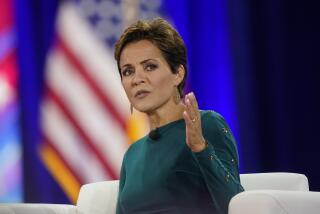McManus: Romneyâs âelectabilityâ is key
New Hampshire Republicans are practical people.
As I traveled around the state this week, voters who said they supported Mitt Romney in Tuesdayâs presidential primary consistently offered two reasons for their choice.
One was Romneyâs resume: his experience as both a businessman and a reasonably successful governor of Massachusetts.
But the selling point voters cited most frequently was Romneyâs âelectabilityâ: their sense that in a general election against President Obama, heâs more likely than any other Republican to win.
âI want to get rid of socialism. I like Newt Gingrich. Iâd love to see Newt debate Obama,â said Bruce Potvin, 67, of Rye, who turned out for a Romney rally in a high school gymnasium in Exeter. âBut with all of Newtâs baggage, I donât think he can win. I donât want to lose the electionâŚ. Is Romney going to excite the evangelicals? I donât know. But heâs the only one who can win.â
That practical judgment came from voter after voter, including a burly middle-aged man at the polls in Bedford on Tuesday who refused to give his name but growled, succinctly: âI voted for the guy with the highest numbers.â
It must have been frustrating to other candidates, but a big part of Romneyâs showing lay in his perceived strength rather than in his intrinsic magnetism.
It wasnât surprising that Romney, who won the primary with about 39% of the votes, came in first among high-income voters or voters who considered themselves moderates. Those have long been his kind of Republicans.
But the former Massachusetts governor also came in first among voters who called themselves âvery conservative,â according to the exit poll conducted for major news organizations. He came in first among voters who pronounced themselves supporters of the fiscally conservative tea party. (Ron Paul was a distant second.) Romney even finished first in the votes of evangelical Christians, who some analysts expected to coalesce around former Sen. Rick Santorum, as they did in Iowa.
The only slices of the exit poll population Romney didnât win were voters under 30 and voters with a household income of less than $30,000. In those groups, a plurality went for Paul.
So even though Romney was expected to win in New Hampshire all along, the breadth of his support adds up to a considerable victory for his campaign â because it suggests that Republicans who werenât initially warm to him are increasingly embracing the idea of a Romney candidacy.
It was also a negative achievement for Romneyâs rivals, who managed in New Hampshire not only to fall far short but also to deepen the internecine divisions that have made it virtually impossible for any of them to catch up.
Santorum, who finished a surprisingly close second to Romney in Iowa, arrived in New Hampshire with an appealing message about restoring blue-collar jobs â but then allowed himself to be drawn into shouting matches over gay marriage and contraception. Gingrich, who left Iowa bristling with resentment over the Romney campâs negative advertising, spent most of his time attacking Romney as too moderate and â weirdly for a Republican primary â too capitalist, and lost altitude in the process.
Former Utah Gov. Jon Huntsman Jr. won third place in New Hampshire thanks to the stateâs independent voters, but many of them said they would have been happy to vote for Romney too. âI voted for Huntsman on Tuesday, but Iâll be with Mitt in November,â said Carol Fairfield, 54, of Belmont. (And Fairfield, like many New Hampshire voters, did her homework; I ran into her at town meetings on successive days with Gingrich, Santorum and Huntsman.)
About the only voters who didnât seem likely to reconcile with Romney were the militant legions of Ron Paul, who turned up at Romney events across the state to wave signs alongside protesters from the Occupy Wall Street movement.
But the Paul phenomenon was good for Romney too. By seizing second place with 23% of the New Hampshire vote, the peppery libertarian made it impossible for anyone else to stake a claim as the strongest conservative alternative. It may be Romneyâs greatest strength that no other single candidate has emerged as his strongest competitor.
The question now is whether voters in South Carolina, where the electorate is more conservative and more evangelical than New Hampshireâs, will embrace the same practical rationale and give Romney another victory.
For all the ideological fervor that South Carolina campaigns historically summon, the polls there already show Romney in first place with an average of 29%, well ahead of Gingrich. One survey, from Time magazine and CNN, found that Romney has the support of 37% of Palmetto State voters.
âElectabilityâ can be a self-sustaining chemical reaction. Now that Romney has finished first in both Iowa (by an eyelash) and New Hampshire â a feat no non-incumbent Republican had ever accomplished â his aura of inevitability has grown. If he wins in South Carolina on Jan. 21, the race for the GOP nomination will be over â and there wonât even be much shouting.
More to Read
A cure for the common opinion
Get thought-provoking perspectives with our weekly newsletter.
You may occasionally receive promotional content from the Los Angeles Times.











